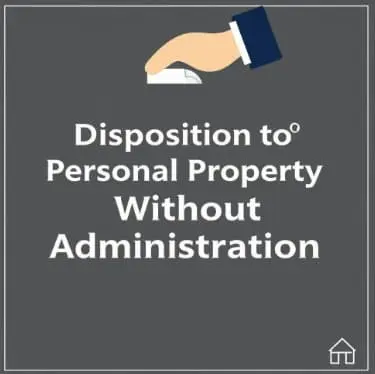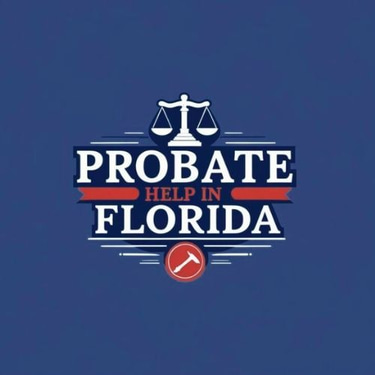
DISPOSITION OF PERSONAL PROPERTY WITHOUT ADMINISTRATION PACKET
$111.00
In Florida, Disposition of Personal Property Without Administration is a simplified probate process that allows certain small estates to avoid full probate when the only assets are minimal and used to pay for final expenses (like funeral or medical bills). This is often called “no probate” or “non-administration”.
⚖️ What Is It?
It’s a legal process that allows heirs or beneficiaries to request the release of a deceased person’s small personal property (e.g., bank accounts, refunds, etc.) without going through formal probate, as long as certain conditions are met.
✅ When Is It Allowed? (Florida Statute § 735.301)
To qualify for this process in Florida:
No real estate can be involved.
The deceased did not leave other significant assets.
The value of the estate must be less than:
The amount of funeral expenses (up to $6,000)
Plus reasonable medical and hospital expenses from the last 60 days before death
The person requesting the assets has paid or will pay those expenses.
💼 Assets That Can Be Claimed:
Bank accounts
Refunds from utilities or insurance
Unpaid wages
Personal items (furniture, jewelry, etc.)
Life insurance or other small death benefits payable to the estate
NOTE: Real estate is never allowed under this process.
📝 How to File (Florida Process)
The person seeking the property (often a relative who paid expenses) must file a petition in the county probate court where the deceased lived.
Required Documents:
Petition for Disposition of Personal Property Without Administration
Certified copy of the death certificate
Receipts for paid funeral and medical expenses
Proof of the asset’s value (e.g., bank statements)
Statements or bills showing what's owed or paid
Photo ID of the petitioner
🗂️ DISPOSITION OF PERSONAL PROPERTY WITHOUT ADMINISTRATION
(Florida Statutes § 735.301)
Simplified probate for very small estates
✅ What This Is
This is an alternative to probate for very small estates.
It allows a survivor (usually spouse, child, or close family member) to request release of certain personal property of the deceased without opening a full probate case.
The process is fast, simple, and low-cost.
⚖️ Who Qualifies
You can use this process if ALL the following apply:
The decedent was a Florida resident
No real estate is involved
The only assets are:
Exempt personal property (e.g., household items up to $20,000 in value)
Non-exempt personal property not needed to pay debts
Funeral expenses or medical bills paid by the petitioner
The estate is not needed to pay creditors
You are a qualified claimant (usually a person who paid for final expenses or is a legal heir)
📄 What's Included in the Packet:
1. Petition for Disposition of Personal Property Without Administration
Primary document filed with the probate clerk
Requests release of small assets directly to the petitioner
Lists decedent’s details, asset description, and funeral/medical costs
Must include supporting receipts
2. Certified Copy of Death Certificate
Redact Social Security Number if required
Attach with the petition
3. Paid Funeral and/or Medical Bills
Copies of receipts or invoices showing the petitioner paid
Funeral bills must be paid in full
Medical bills must be for last 60 days of illness
4. Proof of Asset(s) to Be Claimed
Bank statement or check stub
Refund check payable to the decedent
Vehicle title (if applicable)
Any documentation showing value and ownership
5. Statement of Heirs or Relationship
Lists family members and relationship to the decedent
May need an Affidavit of Heirs or Notarized Statement
6. Proposed Order of Disposition (Optional, some counties require it)
A draft order for the judge to sign
Directs the release of assets to the petitioner
🧾 Examples of Qualifying Property
Bank account (small balance)
Refund check (e.g. IRS, Social Security)
Uncashed checks made to decedent
Vehicle (with low value)
Household items (exempt property)
Up to $1,000 in non-exempt personal property (if exempt threshold met)
📌 Where to File
Clerk of Court – Probate Division in the county where the decedent lived
File in person or by mail (some counties allow eFiling)
Disclaimer: I am not an attorney and do not offer legal advice or legal representation. I provide non-lawyer document preparation services using public court forms, based solely on the information you gave me. If your case is contested, involves legal questions, or includes significant real estate, I will refer you to a licensed probate attorney.
Contacts
(727) 386-6040
support@pamprobatehelp.online
